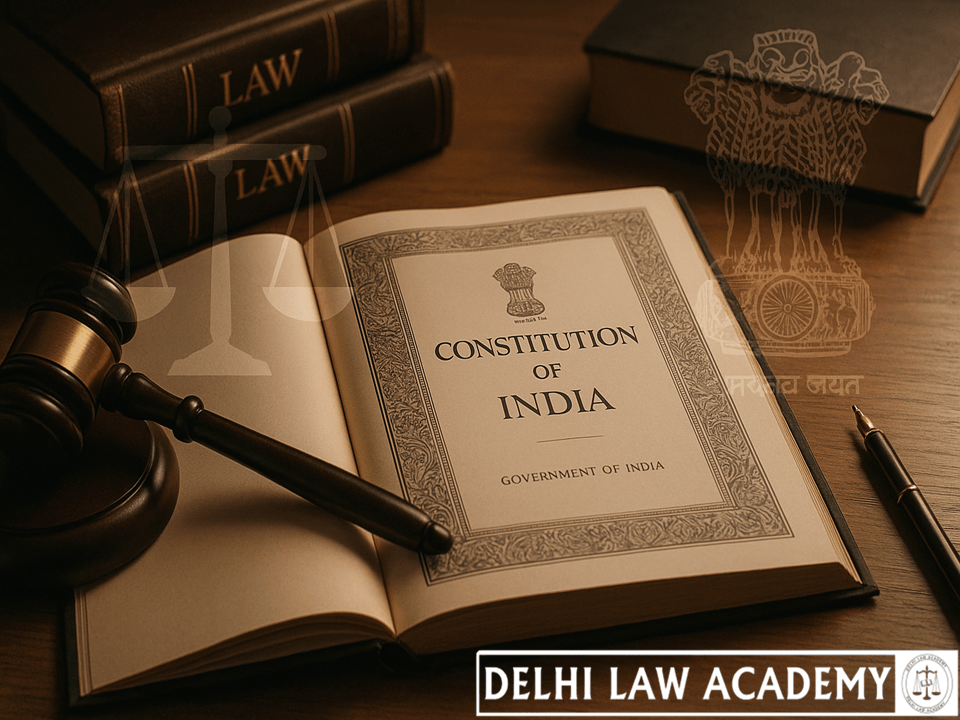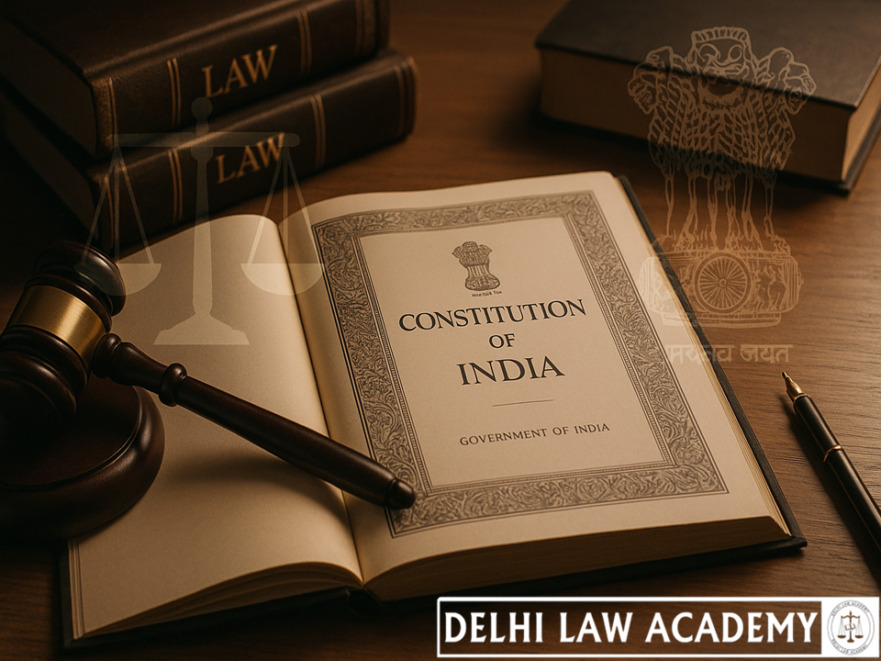
📘 Temporary and Special Provisions – Article 370
Delhi Law Academy Jaipur presents below for aspirants of RJS, DJS, PCS (J) and other Judicial Services throughout India a simplified Note on temporary provisions for J&K as they existed before the 2019 amendments .
📜 Constitutional Provisions
TEMPORARY AND SPECIAL PROVISIONS
ARTICLE 370
Article 370 Temporary provisions for J&K
🔵 ORIGINAL PROVISIONS
Article 370(1)(a)
- Provisions of article 238
- shall not apply to the State of Jammu and Kashmir
Article 370(1)(b)
- Power of Parliament to make laws for J&K
- shall be limited
- (1)
- to those matters in Union List and Concurrent List
- which are declared by the President in consultation with State Govt
- to correspond to matters specified in the Instrument of Accession…
- (2)
- to such other matters in these two lists
- which the President may by order specify with concurrence of State Govt
Explanation [wef 17.11.1952]
- Government of the State means
- the person for the time being recognised by the President
- on recommendation of the Legislative Assembly of the State
- as the Sadar-i-Riyasat of Jammu and Kashmir acting on the advice of Council of Ministers
- “Sadar-I-Riyasat” is now replaced by “Governor”.
Article 370(1)(c)
- Provisions of article 1 and article 370
- shall apply to the State of J&K
Article 370(1)(d)
- Such other provisions of this Constitution
- shall apply to the State of J&K
- as the President may by order specify
- subject to exceptions and modifications specified by him
- Provided that no such order shall be issued except
- in consultation with State Govt if the order relates to matters specified in Instrument of Accession
- with concurrence of State Govt if the order relates to other matters
📝 Explanatory Notes by DLA on Article 370(1)
- Articles 370(1)(c) and 370(1)(d) deal with applicability of Indian Constitution to J&K.
- Article 370(1)(c) states that Article 1 and Article 370 of the Constitution shall apply to J&K.
- Article 370(1)(d) states that other provisions of the Constitution can be made applicable to J&K with such “modifications as the President may by order specify”.
- However, Article 370(1)(d) requires that the President secure consultation/ concurrence of J&K government before issuing such order.
Article 370(2)
- If
- the above referred concurrence of State Govt be given before the Constituent Assembly of the State is convened
- it shall be placed before such Assembly
- for such decision as it may take thereon
Article 370(3)
- Notwithstanding the foregoing provisions of this article:
- President may declare, by public notification
- that this article shall cease to be operative or
- that this article shall be operative only with such exceptions and modifications as he may specify:
Provided that
- Recommendation
- of the Constituent Assembly of the State referred to in clause (2)
- shall be necessary
- before the President issues such a notification
📝 Explanatory Notes by DLA on Article 370(3)
- Article 370(3) states that the President can issue a notification making the whole of Article 370 inoperative if such a recommendation is made to the President by the Constituent Assembly of J&K.
- Article 370 was intended to be temporary until Kashmir’s Constitution was drafted and the Constituent Assembly of Kashmir had the power to recommend abrogation of Article 370 to the President.
- The Constituent Assembly of Kashmir however dissolved itself in 1957 without making any recommendation for amendment or abrogation of article 370.
- Supreme Court has ruled on multiple occasions that Article 370 is now a permanent part of the Constitution since the only body that could have abrogated it has been dissolved without doing so.
Orders under article 370
- Under article 370, the President issued the first Order in 1950
- In 1952, there was an agreement at Delhi between GoI and State of J&K.
- In 1954, Constituent Assembly of J&K approved the State’s accession to India and the Delhi Agreement
- In 1954, President issued the Constitution (Application to J&K) Order superseding the earlier Order of 1950. This Order regulated the Constitutional position of J&K till 5 August 2019.
⭐ Prominent Features of the 1954 Presidential Order:
- Name, area or boundary of J&K cannot be changed by the Union
- without consent of its legislature
- J&K has its own constitution
- Part VI of Indian Constitution is not applicable to J&K
- Parliament can make laws on most of Union List matters and
- on a good number of Concurrent List matters
- Residuary power of law making belongs to the State legislature
- except in matters like terrorism, sovereignty, integrity etc.
- Preventive detention laws made by Parliament
- are not applicable to J&K
- Part III is applicable to the State with modifications
- Right to Property is still a Fundamental Right in J&K
- Special rights are granted to permanent residents of State
- in matters of public employment, settlement and immovable property
- Part IV and IVA of Indian constitution are not applicable to J&K
- President has no power to declare a financial emergency in J&K
- National Emergency on the ground of internal disturbance
- requires concurrence of State govt
- Article 356 is applicable, but in a different form
- President’s rule can be imposed under Indian Constitution, and
- Governor’s rule under State constitution
- Amendment to the Constitution does not apply
- unless it is extended to the State by a Presidential order
- Provisions relating to special leave jurisdiction of SC, Election Commission and CAG
- are applicable to J&K
- J&K High Court can issue writs only for enforcement of FRs
- and not for any other purpose
📘 Stay Ahead with Delhi Law Academy!
Get access to free monthly current affairs, read our insightful blogs,
and explore free study resources prepared by experts at DLA Jaipur. 🚀
❓ FAQs on Article 370 (Temporary & Special Provisions)
📘 What were the original temporary provisions for J&K under Article 370?
Article 370 originally granted J&K a special constitutional status. Only Article 1 and Article 370 applied automatically, while other provisions applied only through Presidential Orders issued in consultation or concurrence with the State Government. Parliament’s law-making power was limited to matters specified in the Instrument of Accession and others approved with State concurrence.
📜 How did Article 370(1)(d) allow the President to extend the Constitution to J&K?
Article 370(1)(d) allowed the President to apply other provisions of the Indian Constitution to J&K with “exceptions and modifications”. Such orders required consultation if the matter was part of the Instrument of Accession, and concurrence if it was not. This clause formed the basis of all Presidential Orders modifying the constitutional relationship of J&K with India.
🏛️ Why did the Constituent Assembly’s role under Article 370(3) make the provision effectively permanent?
Article 370(3) required a recommendation from the J&K Constituent Assembly before the President could declare Article 370 inoperative. Since the Constituent Assembly dissolved in 1957 without giving any recommendation, courts held that Article 370 effectively became permanent because the only body capable of advising its abrogation no longer existed.
📝 What was the significance of the 1954 Presidential Order under Article 370?
The 1954 Order was the most important Presidential Order issued under Article 370. It superseded the 1950 Order and governed the constitutional relationship between India and J&K until 2019. It applied many parts of the Indian Constitution to J&K, introduced special rights for permanent residents, and retained the State’s separate Constitution and autonomy in several areas.
⚖️ Why did J&K have its own Constitution and special legislative powers?
Under the 1954 Order, J&K retained its own Constitution and had exclusive powers over residuary subjects except for sovereignty-related matters. Part VI of the Indian Constitution was not applicable, and Parliament could legislate only on specified Union List and Concurrent List matters. This framework preserved the State’s autonomy as originally envisaged in Article 370.
📑 What restrictions existed on the High Court and President’s powers in J&K?
Under the 1954 arrangement, the J&K High Court could issue writs only for enforcement of Fundamental Rights, unlike other High Courts which could issue broader writs. The President could not declare a financial emergency in the State, and a national emergency based on internal disturbance required the State Government’s concurrence.
Contact us
📍 Delhi Law Academy – Jaipur Branch
6C, Tower 2, Coaching Hub, Pratap Nagar, Jaipur – 302033
📞 Phone:
+91 9911916552
+91 8447285606
✉️ Email:
contactus@delhilawacademy.com

